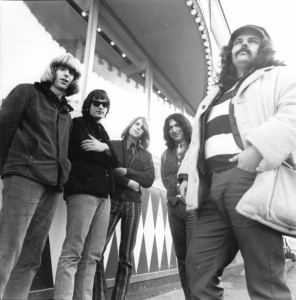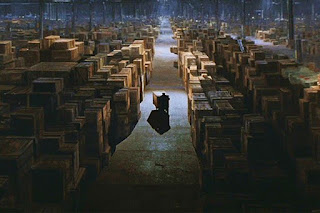The Grateful Dead and Digital Audio/Video
The Grateful Dead and Digital Audio/Video
This week's readings about the debates and technologies of digitizing audio and video are well exemplified by the music and fans of the rock band, The Grateful Dead ("The Dead" from this point forward). From its lifetime of 1965-1995, and in the various incarnations still touring (Dead and Company is in DC in November, and Phil Lesh is playing in DC in October), the band built a loyal and deadicated fan base, many of whom toured with the band for multiple shows or tours. Fans started recording (aka "bootlegging") shows and shared/traded (and some evil fans sold) them with other fans. In the 1980's, the band openly embraced the recording and trading, and even set up tapers' sections for fans with recording equipment. The Dead eventually hired an Archivist to start organizing their collection of recordings in "The Vault," and he restored and preserved these concert recordings.
The Grateful Dead, 1967. Photo by Herbie Greene. www.dead.net
The archivist (and fans) had to deal with the realities of preserving decades-old analog and digital recordings. Shows from the 60's were recorded on reel to reel or tape, often with hidden or cheap microphones. These tapes then sometimes sat in closets, storage sheds, garages, etc... for decades. A recent discovery of a "treasure-trove" of old recordings needed massive restoration work, but it seems to have paid off as these shows have started showing up as commercial releases. Some fans complain that the Dead have not released enough 1980's shows, and the archivist explained (though some still do not accept) that the analog cassette tapes used to record the shows no longer sound that good, or don't allow good digital remastering.
Fan demand finally led the band to release the "Dick's Picks" series of albums with CD releases of top shows. These first shows were released "as is," and did not always have the best sound or quality, but it felt a little like you were at the show. The Dead released other archival digital albums, and "Dave's Picks" is the current quarterly archive release program. Because the Dead allowed fans to tape and trade shows, fan networks and trading groups formed to share them. They adapted to the ease of the internet, and created message boards, email lists, and trading sites to help connect fans. In recent years, bitTorrent and other high-speed peer-to-peer networks allow fans to share digital files of shows quickly and easily.
A network of fans created an online database of recordings on the Archive.org site. Here you can finds thousands of concert recordings for hundreds of bands that allow free distribution of their shows (though many have pulled Soundboard recordings which they intend to use for commercial releases). A link to this database is on my blog's main page. In addition to the band's archivist and his team, some fans restore and remaster shows and upload the results for all to enjoy.
The text discussed the values of various compression formats, and traders/fans use different compression formats to distribute music. There are active (and passionate) debates between fans on the best file formats, the best transfer software, and the never-ending debate over digital vs vinyl. There are several popular Lossless audio formats that now allow downloads of compressed files that do not lose any quality. Many fans are hard-core audiophiles, and will never go back to MP3's and their lower quality.
The Grateful Dead on stage, 20 July 1994. Photo by Bill Smythe. www.dead.net



One of the reasons that I teach this course is so that I find new things in the digital world (and that students point me to new things). I had long known that the Dead had taken a proactive approach to the bootlegs but had no idea that it had evolved into such a formalized approach. I'm going to highlight your post in the course notes.
ReplyDeleteAt the same time, I have always wondered why more bands do not make available their concert recordings online (it is, after all, a possible revenue stream). The soundboard is already there and the recording is being made, and so why not use that recording. So, of the 30,000 at the GnR concert in Hershey, a bunch of them would by the recording.
You also mentioned the archivist here, and that is something important to consider. You've got to convert format to digital format; the file has to be normalized, etc. Lot of work there.
Super post.
Prof. Evans,
ReplyDeleteThank you for the comments. The Grateful Dead initially fought it, or fought it when it was blatant, but over time they realized it was an easy way to make new fans, and keep old fans happy and involved. After their breakup, they've maintained a steady revenue stream with CD, vinyl, and digital live releases. Many of the heirs to the Dead (ie: Phish or Widespread Panic) now sell digital copies of their shows for download or CD via the web. The website www.nugs.net also sells digital copies of concerts for many bands. Some bands also allow fans to buy a digital copy/download at the show, or give a coupon to download it afterwards.
As album sales continue to decrease and more bands rely on touring revenue there could be a further expansion of bands selling their shows. Many bands play the same setlist each show, while bands like Phish play a different setlist at each show. Some artists are perfectionists (ie: Pink Floyd) and don't like releasing anything less than perfect, which is a challenge in live shows. They just opened their archives and released a large/expensive box set of early recordings and videos. I'm still waiting for another early 1970's live album, and I'll probably wait for a long time. Axl Rose was/is a perfectionist too, so he may hesitate to share.
The Dead's archivist works full time on their audio and video collections. I think the actual recordings moved to a university for storage and preservation, but the archivist leads the work.
As long as bands release them, I'll keep buying live albums.
Nice blog. Live music is still better than any other form, but albums with live gets close. Since you know so much about this, I think you might be a musician. Thanks for this insight.....And now some students might be considering jobs as musical archivists!
ReplyDelete